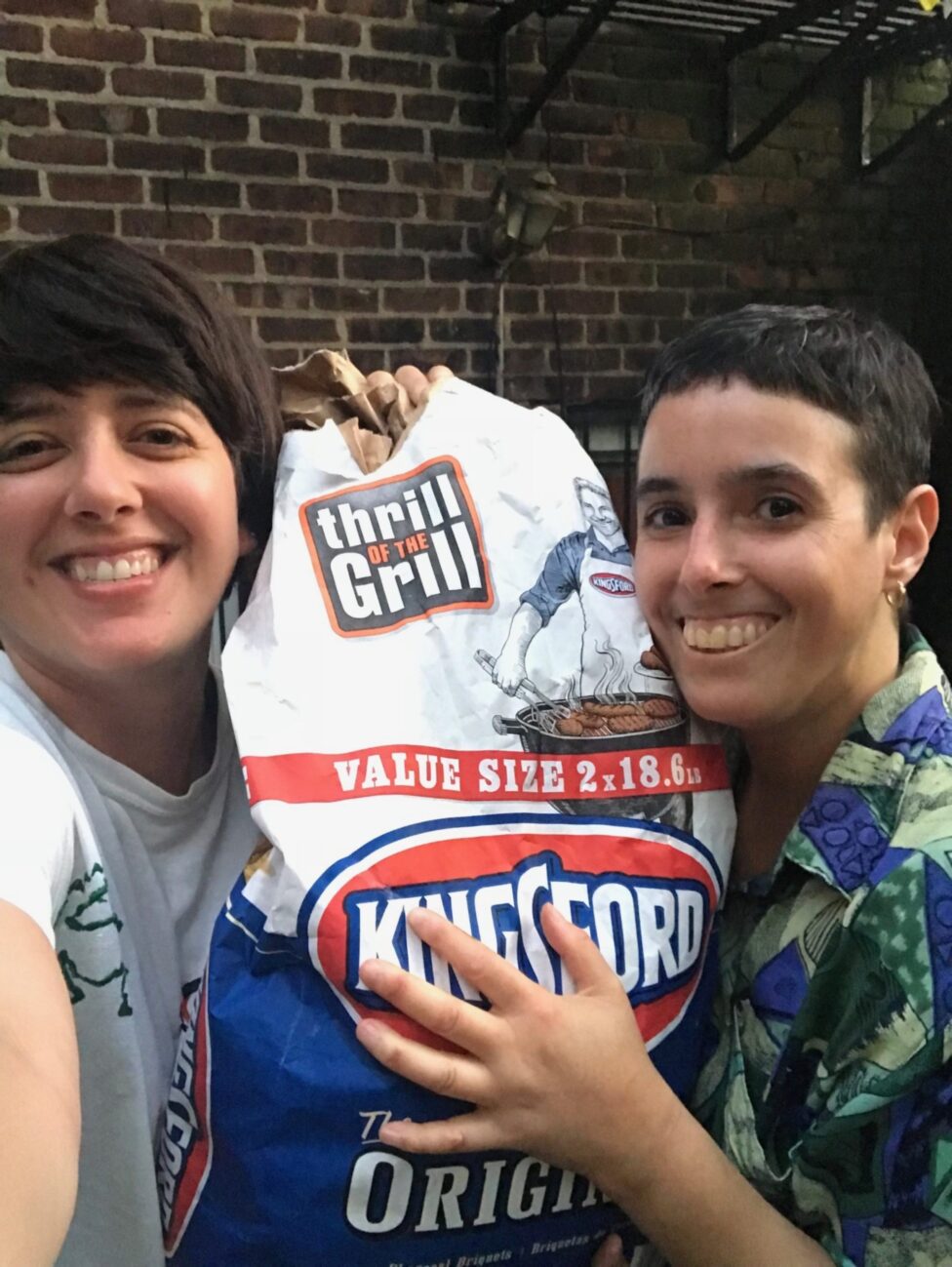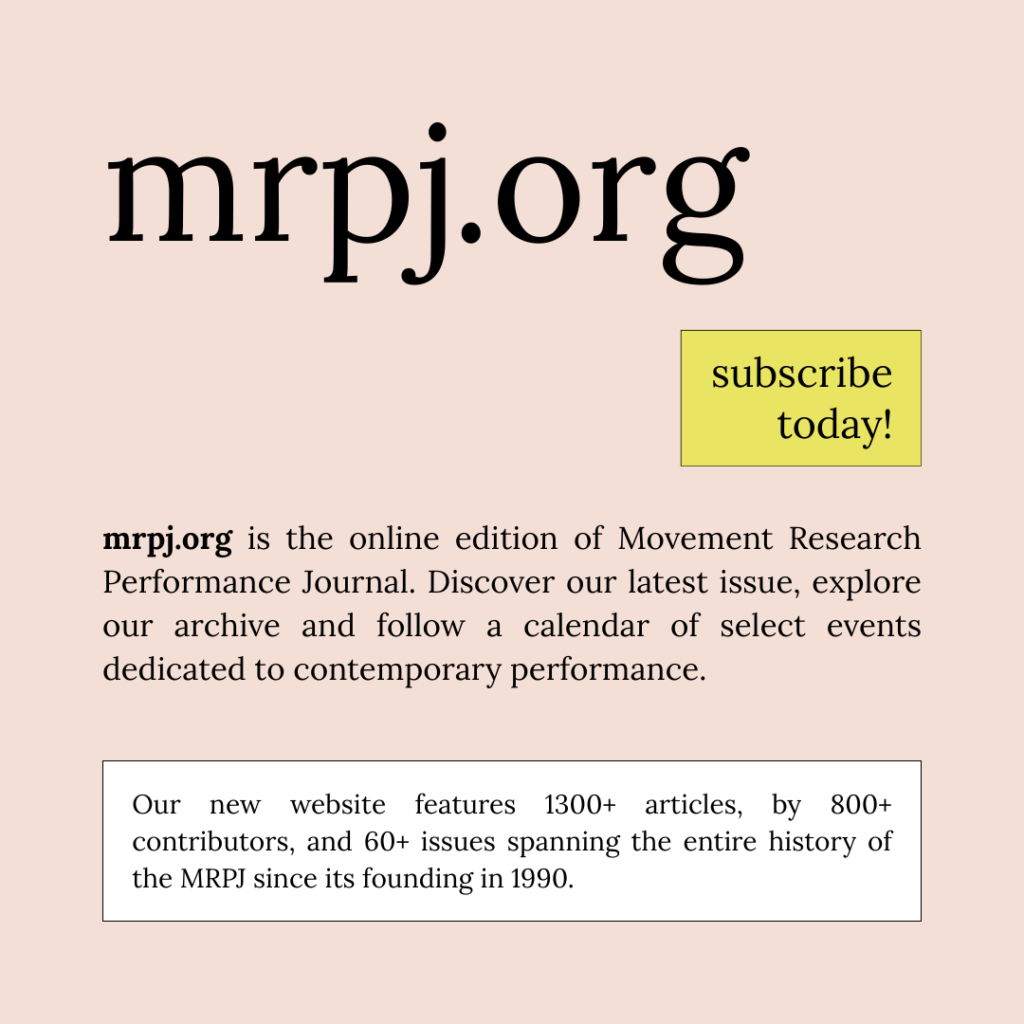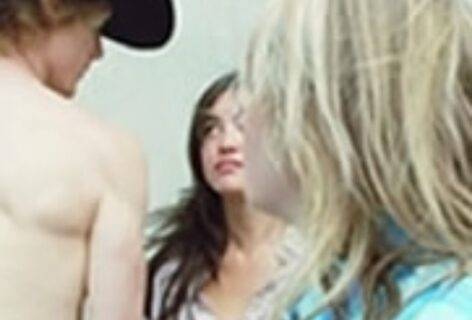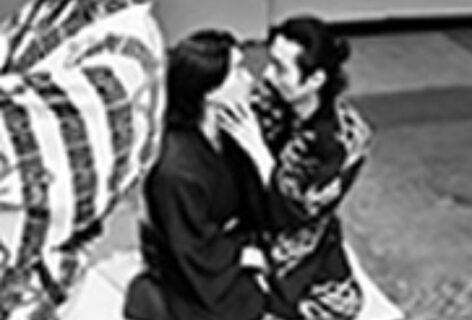Tess Dworman: We are eating hot dogs that we grilled in my backyard and we have talked about how our styles of grilling might possibly be related to the way we make our performance work.We were starting to talk about the concept of doing something before you know what it’s about. Or why you’re doing it. We have no idea what we’re going to talk about right now.
Amelia Bande: When you’re making work, you don’t feel like you have to have a theme, but then you sometimes feel forced to define it? Forced is a strong word.
TD: Forced is a strong word. I don’t feel forced, I feel encouraged to have the work be about something because that would make it easier for everyone. That’s never the case and I could never really tell you what’s going on.
AB: I don’t think the audience needs the topic in order to understand and have a reaction. But, institutionally, in order to get support to do the work or produce the work, there are a lot of questions surrounding what the work is about or what’s the reason for making it. I guess they have to ask something. But in the actual relationship that happens, within the work that’s being shown, none of that is necessarily needed. When I’m looking at something that doesn’t speak to me, and then I read the thing on the side that describes the process or idea I’m like “Oh, now I get it!” Suddenly I understand it and I can enter the piece. I don’t like that to happen with my own work. I don’t want people to have to read a program before coming in to have the experience.
TD: I feel similarly. It should speak for itself. Or, I want it to speak for itself. I’ve been thinking about work being about things. What is my work about? I am having to describe where I am in this particular stage for applications. I use a lot of language about trying to get the audience on the same page as me. I’m asking the audience to be confused along with me, not for the sake of confusion and chaos, not in a nihilistic sense.
AB: You don’t want to make people uncomfortable. *wind chimes in the background*
TD: Not any more than we already feel on a regular basis. There’s a lot of not knowing that we experience on a regular basis and we’re very good at being in that place. I want to highlight that. Here we are working out our mission statements on Critical Correspondence!
AB: Out loud and for the world to hear! I think that’s okay.
TD: We ate and I’m very full.
AB: This pickle is so intense.
TD: So salty.
AB: Yeah, it’s sour. I like that idea of allowing yourself and the audience to experience something that is also natural outside the theater. I have been inclined to produce a narrative that has an arch. I’ve also started to see how that is something that’s very easy for me to do. I feel comfortable creating a beginning, middle and end. I can easily transmit an emotion at a particular time. I work a lot with text and words trying to tell a story and people have liked that, but now I’m thinking about breaking that. In the past two years I’ve started writing differently, without knowing what the particular timeline of a story is or what’s happening.
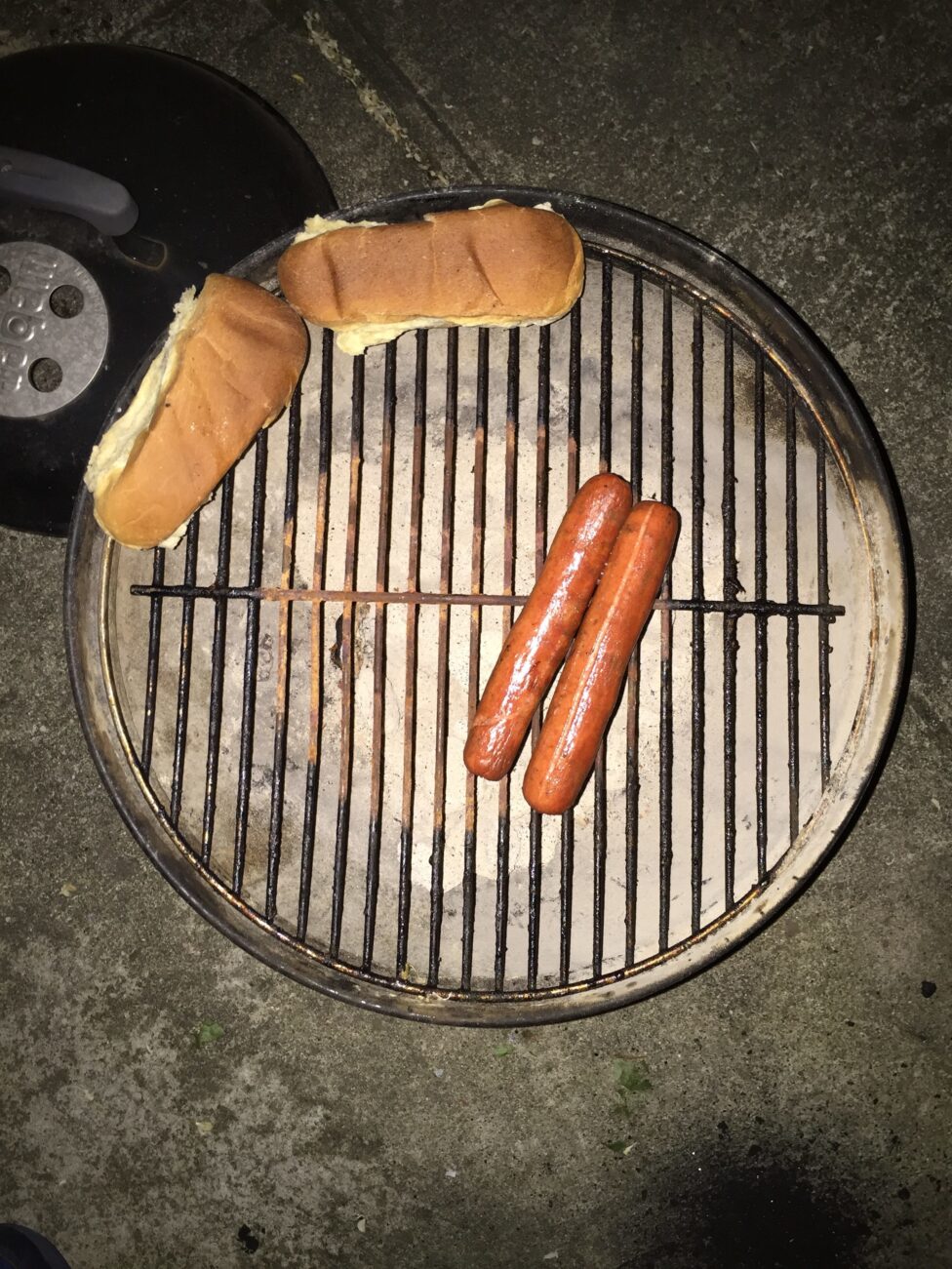
Two Hot Dogs and Two Buns On Grill, photo by Amelia Bande
TD: I’m experimenting with including narrative but just as an offshoot, to create the feeling of narrative for a moment. In all the work I’ve been doing — the application writing and trying to figure out the aboutness prematurely or trying to legitimize myself by figuring out what it’s about — I find myself going into the psychology of it, where I am when I’m making and why I might have certain impulses. I have been thinking about this desire to be able to become anyone through improvisation, for people to see what I’m doing and easily insert their own content or create their own content out of what I’m doing. It’s a really specific kind of white blankness. A white neutrality that I have been investigating… forever. I’m thinking about how the psychology behind that, the ominous presence of being a white person and feeling the desire to want to become anything or anyone and believe that anyone who sees me could believe that too. That’s a weird road to go down.
AB: That’s a pretty specific thing. Because we were talking about it not having that kind of content, right? When you said that about the psychological impulse, the idea that comes from it seems very specific and relevant. It’s not at all vague, it’s not at all about nothing.
TD: I don’t think I go about it in a very intentional way. In reflecting on what I’ve done and what I want to make, there’s not this impulse like “I want anyone to see me and I want to represent this sort of universal experience.” It’s more of an embodied sense. It’s not intentional, it’s a reflection. Improvisation. I’m not sure what to do with it moving forward except just to know that and to accept it or acknowledge it.
AB: Is that what you’re trying to do now in the solo piece that you’re making?
TD: I’m a little freaked out about it. I think there are a lot of strong qualities about what I’m trying to do. I’m remaking a solo that I made six or seven years ago and it’s totally improvised but it’ll be very different. When I first made this solo, it really changed the way I worked. I want to go back and see what else is there.
AB: When I saw your work there was something of what you’re saying in terms of narrative and structure and blankness. It’s so specific, and it’s a total fantasy, but it feels so realistic that it’s very easy to enter those fragments and imagine oneself in those situations or in those movements. It happened to me when I was seeing it, I was having these very vivid images. We were in a rehearsal room that had nothing in it, it could’ve been anything or anywhere, but what I was able to imagine by seeing you move was very specific. I was like “Oh, it’s this person at the mall, walking around with the tote bag, waiting for someone.” The way in which that improvisation was happening, your body was very… I don’t know if realism is the word or what.
TD: Spoiler alert. That’s definitely part of the intention — to show an experience that might feel familiar to other people. I am thinking about how the neutrality that can be put onto my body is part of this. That doesn’t necessarily mean I’m going to try to completely change what I’m doing or cut it out, all I’m doing is moving forward knowing that. That’s the only way I can continue working. I’m not going to try to purify myself… because it’s appropriation.
AB: Yeah totally.
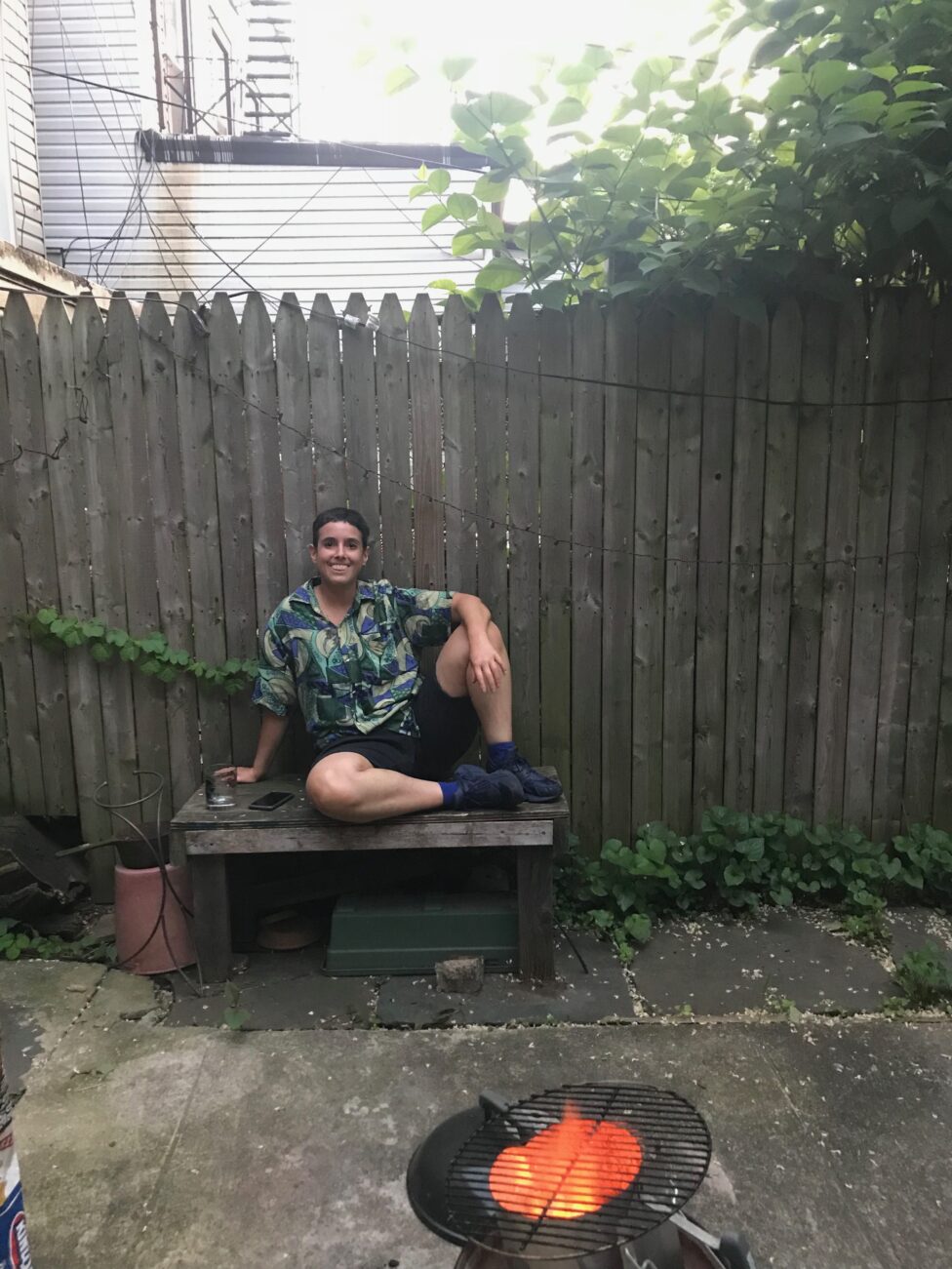
Amelia Bande on Bench with Grill, photo by Tess Dworman
TD: Now you! You were saying that you have a narrative arc or you’re noticing that is a big part of what you do.
AB: The narrative is always there. The thing is, what to do with it. The thing I’m trying to say is “How do you work with language in a way that language is a material, not a story?” As a young person my origin was in theater, so the three-act structure was very predominant. I used to do these lo-fi musicals in Chile and there was definitely a narrative arch there, stories that had a climax and then ended. That has always been very satisfying for me. I love cinema and I love TV series for that arch. I consume it all the time and I never get tired of it. There’s something in it that I think we crave as human beings. But now, with what is happening in the world politically, that way of narrating has become a little bit obsolete and not true anymore. I don’t know if it’s because it’s actually a crazier time or because of the way we consume it through our phones and how it comes to you. It is not like you sit at the kitchen table in the morning and you open a newspaper with your coffee. Now it is a constant flow of disturbing things happening all the time and you can’t put a pause to it. I’ve started seeing words differently. The timeline of events has become less relevant and it gets broken all the time. It also relates to my personal life and how that timeline is also being disturbed. It doesn’t matter how much effort I put into planning what’s going to happen or the care I put in relationships or what I imagine life could be. Life happens in a way that disturbs all of that all the time. I’ve had to learn how to navigate it all in a more detached and freer way, while still caring for people and loving myself and all of that shit. I think if my work could be about anything it’s about relationships. Not romantic relationships but relating to another person. How that’s complicated and how can language explain that complication. I don’t know if it is with a three-act structure.
TD: Although that structure is very strong. I’m in an ongoing battle with that version of absorbing messages and stories. The aboutness… it’s there. I want my work to be a truer version of how we synthesize messages and information in our lives. How it comes at us, how it translates.
AB: I want the words disturbed. I keep on having words in Spanish in my head, like interrupt or bother. The characters in the play I just wrote are uncomfortable with how things are going and they’re also ethically questionable. They all wish for something to be better. There’s a lot of talk I hear about “I just want to make the world better.” I have that question for myself also in terms of activism, what’s something I could do? Of course there’s many things I could do and some things I do, but it always feels frustrating to me. Going to a protest is very frustrating to me, because I am like “Who’s seeing this?” I think it’s important, but at the same time I’m always thinking about the gesture that’s needed and how powerful it needs to be and that it is never powerful enough. I don’t know, it’s a bit pessimistic.
TD: I think it’s very realistic. I’ve noticed this in other people’s work too. Or, maybe I’m just deciding that this is what’s happening. It seems everyone is dealing with all the doubt about the moment.
AB: This doubt makes me think about Yanny or Laurel.
TD: That gives people a good sense of when exactly we are talking. It’s late spring 2018. I’m a Laurel, Amelia’s a Yanny.
AB: I feel very upset about that. I heard that Jimmy Kimmel said Laurel was correct. And then I feel like “Why am I hearing Yanny?” I felt frustrated about it, and I listened to the thing over and over again desperately wanting to hear Laurel.
TD: It’s a beautiful metaphor for the time that we’re living in. Although I don’t think the people on opposing sides are so desperate to hear the other side. I think they’re just like, “No you’re fucking crazy. It’s saying Laurel.”
AB: Isn’t that like a symbol of the times though?
TD: Yeah, that’s what I just said.
AB: I know, I’m repeating it.
TD: It’s polarizing.
AB: It’s crazy how extreme the polarizing effect has globalized.
TD: No one is trying to hear Laurel.
AB: No. I’m trying!
TD: You’re out here trying.
AB: I really wanted that, but life is cruel.
TD: Life is cruel.
Interview has been condensed and edited.
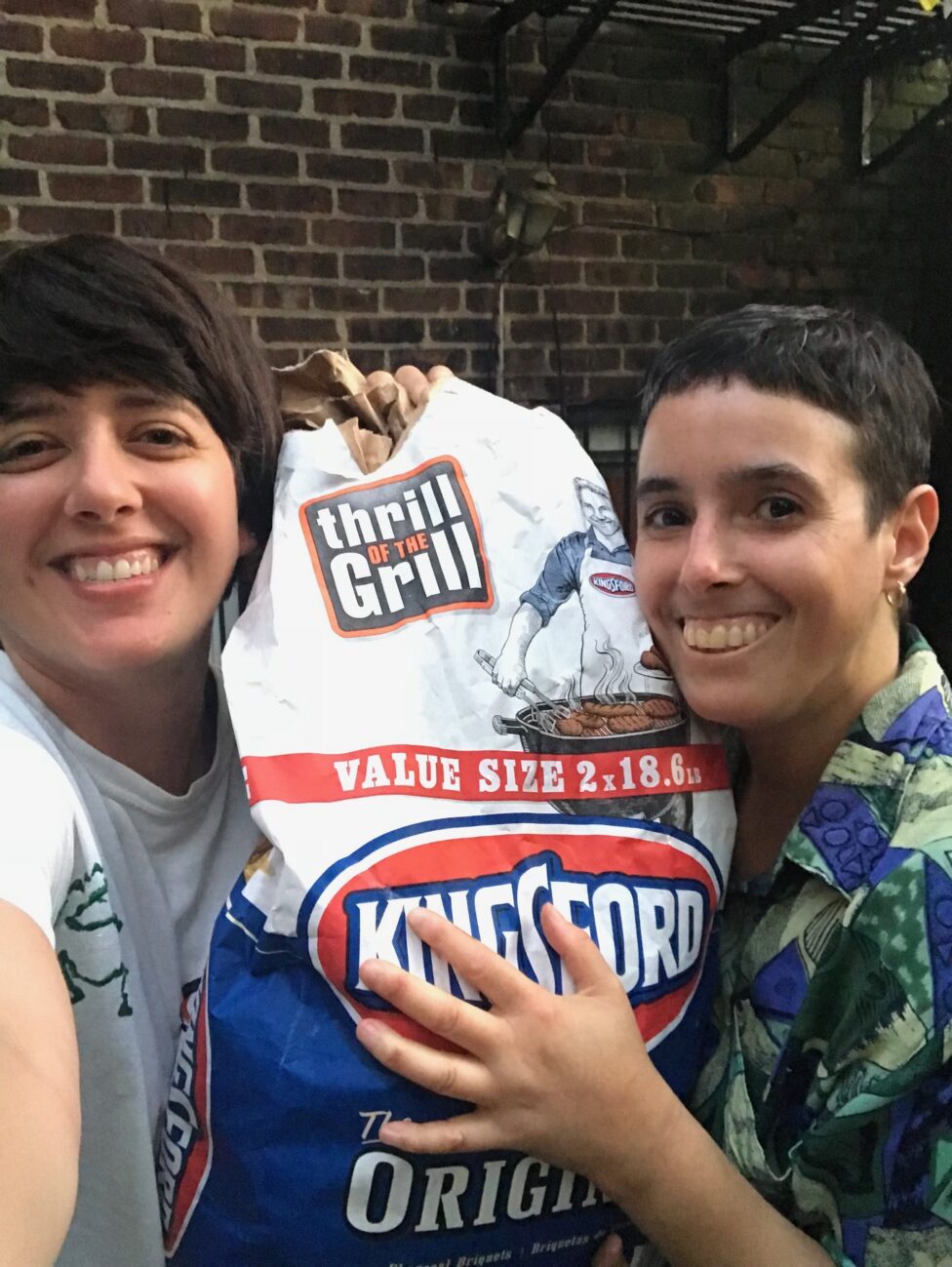
Tess Dworman and Amelia Bande, photo by Tess Dworman

